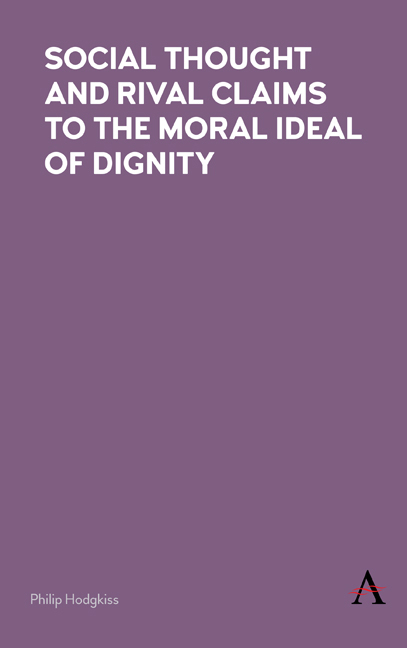Book contents
- Frontmatter
- Contents
- Preface and Note on Text Structure
- Acknowledgements
- Chapter One Introduction: The Distinction of Dignity
- Chapter Two Dignity, Freedom and Reason: From Ancient Greece to Early Modernity
- Chapter Three The Sense of Dignity in Moral Philosophy: From the Ethical Intuitionists to the Irrationalists
- Chapter Four Marx's Critique of Morality: Natural Law, the State and Citizenship
- Chapter Five Classical Sociology's Regard for Human Dignity
- Chapter Six The Human Face of Dignity Reflected in Phenomenology and Existentialism
- Chapter Seven A Fresh Term for Dignity: Attending the Frankfurt School (Both ‘Old’ and ‘Young’)
- Chapter Eight Notes Sampling Research and Practice: Making Dignity Work; Making Dignity Care
- Chapter Nine The Slighting of Dignity: The Critic's Charter
- Chapter Ten Conclusion: After the Recognition of Dignity
- Notes
- Bibliography
- Index
Chapter Four - Marx's Critique of Morality: Natural Law, the State and Citizenship
Published online by Cambridge University Press: 21 June 2018
- Frontmatter
- Contents
- Preface and Note on Text Structure
- Acknowledgements
- Chapter One Introduction: The Distinction of Dignity
- Chapter Two Dignity, Freedom and Reason: From Ancient Greece to Early Modernity
- Chapter Three The Sense of Dignity in Moral Philosophy: From the Ethical Intuitionists to the Irrationalists
- Chapter Four Marx's Critique of Morality: Natural Law, the State and Citizenship
- Chapter Five Classical Sociology's Regard for Human Dignity
- Chapter Six The Human Face of Dignity Reflected in Phenomenology and Existentialism
- Chapter Seven A Fresh Term for Dignity: Attending the Frankfurt School (Both ‘Old’ and ‘Young’)
- Chapter Eight Notes Sampling Research and Practice: Making Dignity Work; Making Dignity Care
- Chapter Nine The Slighting of Dignity: The Critic's Charter
- Chapter Ten Conclusion: After the Recognition of Dignity
- Notes
- Bibliography
- Index
Summary
Certainly no man in a state can be without any dignity, since he at least has the dignity of a citizen. (Kant 1991, 139)
Natural Law Yielding to the State
By the middle years of the eighteenth century, there were some significant and critical developments in the history of natural law theory, which, by implication, shed new light on human dignity. Rousseau's political problem appears to be twofold: How can freedom be reconciled with control, and, in the natural world, how can we behave compassionately towards our fellows? In the hands of Diderot, the idea of the ‘General Will’ approximates the precept do unto others as you would be done by, but Rousseau's version of the ‘General Will’ extolls, instead, the virtue of a political order encompassing popular sovereignty and a belief in God. In Rousseau, it is the face- to- face relationship of everyone present searching their consciences and arriving at agreement; the will thus realized is to cancel out all particular wills based in vested interest – the succour of social inequality. It is property and government that distort our true nature, and in a situation in which individuals possess a desire for self- preservation and freedom is ultimately a desire for property and control, the ‘General Will’ has the role of overpowering all partial wills, by force if necessary. The autonomous personality comes into being only as a consequence of being bound by the ‘General Will’, which is, in effect, the extrapersonal extrusion of virtue. The dilemma for Rousseau was how can freedom be ‘squared’ with necessary constraint or liberty with authority when both sides are absolute values? His answer, characteristically, did not involve compromise, as had so often been the case for others (e.g. Hobbes, Locke and, later, Mill). Rousseau's way out of this paradoxical problem became the search to find a type of association in which everyone can unite with everyone else, while still obeying themselves alone and remaining as free as formerly.
While in his denial of innate ideas Hume was to attack natural law, his antagonist Rousseau was to be much more constructively critical. From the outset of his seminal discourse on the origin of inequality, Rousseau juxtaposes his central theme with the idea of natural law. The title he proposes for the work asks the question whether inequality is ‘authorized’ by natural law.
- Type
- Chapter
- Information
- Publisher: Anthem PressPrint publication year: 2018



